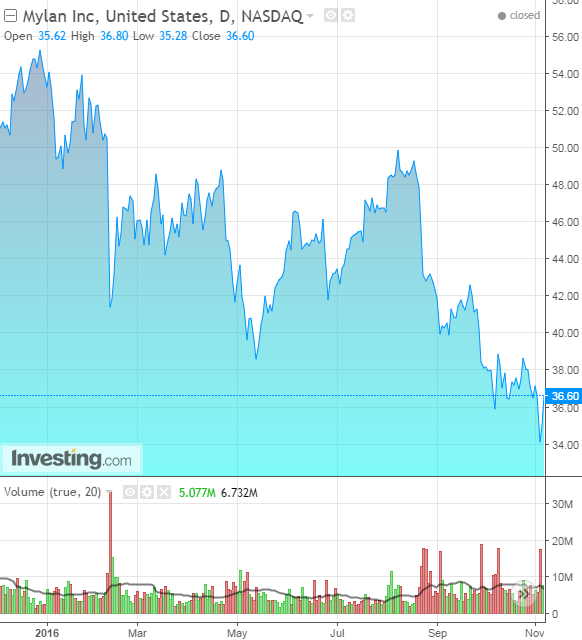by Clement Thibault
Mylan (NASDAQ:MYL), the global manufacturer and distributor of generic, branded generic and specialty pharmaceuticals will release its Q3 2016 earnings report on Wednesday, November 9, after the market close.

1. Earnings and Revenue
Mylan is expected to report earnings of $1.46 on $3.14 billion in revenue. The company's revenues are anticipated to continue to rise, with growth of 16% expected this quarter. Mylan's earnings have also been moving up, although growth in this area has been widely inconsistent over the past year because of rising expenses, varying between more than 20% to the low single digits. This time around, earnings are expected to grow by a meager 2%.
2. EpiPen Controversy
Pricing issues have weighed heavily on the pharmaceuticals sector, particularly since the Martin Shkreli/Turing Pharmaceuticals scandal in September 2015, when news broke that Shkreli, then Turing's CEO, had hiked the price of a drug used to treat AIDs by over 5400%. The latest focus of this growing storm is Mylan, which came under fire in August because of the price of its life-saving EpiPen—a decades-old, auto-injector used by millions of people to combat anaphylaxis brought on by such common things as food allergies and insect bites—which it had inherited as part of a larger purchase of medicinal lines from Merck KGaA (DE:MRK) in 2007.
The Turing scandal goes a long way toward explaining why this whole thing blew up so badly for Mylan this past summer. After MYL acquired the EpiPen, they set out to market the product to parents whose children suffered from a broad variety of allergies and were at risk for anaphylactic shock. Mylan's efforts surpassed their expectations for the EpiPen which isn't even one of their core products. The marketing campaign helped drive the EpiPen price from $100 in 2009, for a two-pack of injectors, to over $600 today for the same two-pack—an increase of more than 500%. To reduce the criticism and calm angry consumers, MYL has decided to launch a generic EpiPen of its own, which will be priced at $300 for a two-pack. While this may appease angry consumers, it will certainly hurt Mylan's specialty segment profit margins.
As if the summertime controversy wasn't enough, in early October word went out that Mylan had reached a settlement with US authorities over the misclassification of the EpiPen in the Medicaid Drug Rebate Program. The company was found to have labeled the device as a 'non-innovator' or generic drug, allowing the company to pay lower rebates to the US government on purchases of the drug. The $465 million settlement, which Mylan has agreed to pay, is expected to show up in the company's report this quarter.
Both issues likely won't fade away any time soon as they go deeper than controversies and settlements. Pharmaceutical companies, Mylan included, have become the eye of a political storm surrounding drug pricing, affordability and pharmaceutical company practices. Hillary Clinton has called on Mylan to reduce the price of its device yet further and has recommended a Federal 'response team' monitor drug price hikes going forward. The idea of governmen controls on the price of drugs is a nightmare scenario for big and small pharma as well as investors who follow and buy the sector. Indeed, the current political environment is one of the leading reasons why the NASDAQ Biotechnology Index is down over 26% since the beginning of 2016.
3. Generic Drugs
Mylan's core business, generics, involves recreating drugs whose patents have expired, generating competitive offerings and driving prices down. Mylan's generics business is actually performing well, growing at a 10% rate over last year, a noteworthy accomplishment considering that generics represent 85% of Mylan's business. This rate of growth is expected to continue over the next few years, and would be great news for the price of Mylan's stock – if the company were not to become embroiled in another scandal.
Unfortunately, last Thursday, a report was released that a Federal inquiry into drug price-fixing has found more meaningful evidence than previously thought that the practice is widespread and ongoing. The report named Mylan and Teva (NYSE:TEVA) along with nine other pharmaceutical companies, and led to a sharp, 8% drop in the stock's price when the news broke.
Conclusion
Mylan's ongoing and multiple legal issues should be a serious concern for investors. Indeed, the stock is now down to $35, less than half of its high of $76 in April 2015. Still, along with the EpiPen it has a number of successful lines including Simvastatin, a cholesterol reducer, and Omeprazole which is used to treat digestive issues. Nevertheless, the presidential election, coupled with several calls by US senators to intervene in the pharma industry and a price fixing scandal are probably more than many investors are willing to take on at this point.
If one was to ignore all of the above and focus on the numbers, Mylan would be a solid company in which to invest. Revenue has been up every quarter since 2010, the company has a reasonable 22 P/E ratio, cash flow of $2 billion TTM from operations, current liabilities of $3.7 billion but on $6 billion in current assets...and that's not counting the fresh $6 billion it just raised from a bond offering.
However, right now Mylan is simply plagued by too many legal issues to be a solid buy. First, watch the elections since the results will undoubtedly affect not just Mylan, but the entire healthcare sector. But do keep an eye on Mylan. With its solid fundamentals it could be a good risk/reward play should its share price drop further. We like the company for the longer term and believe there will come a period of reduced uncertainty paired with a good entry point. But that period is not now.
